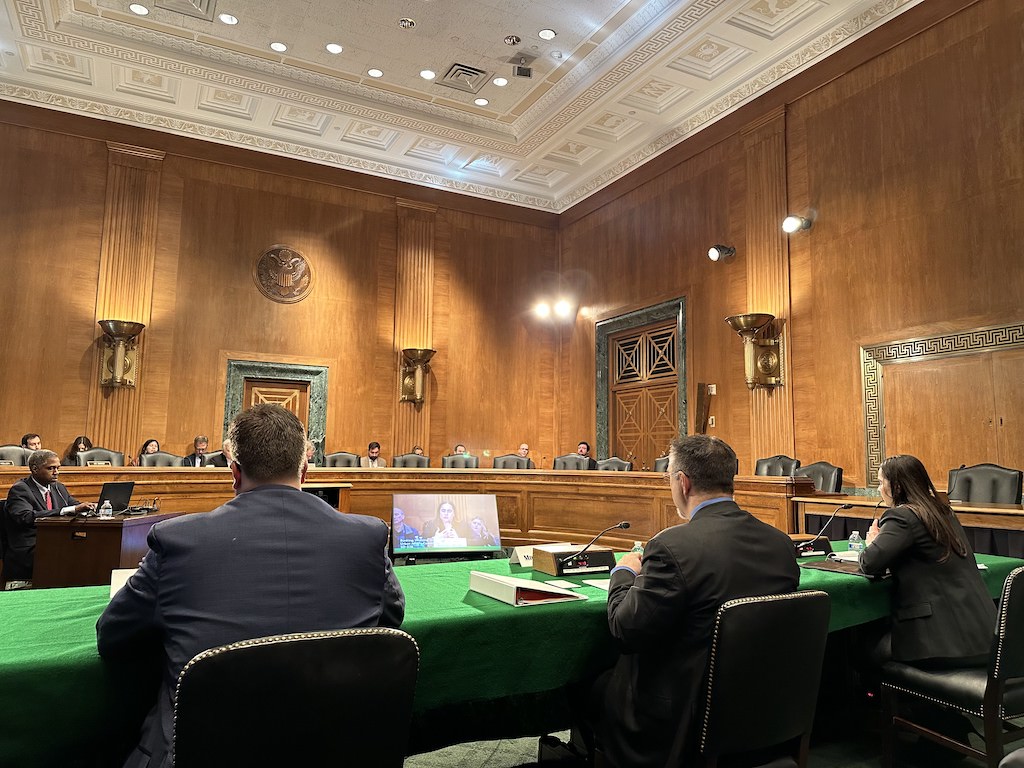WASHINGTON – Americans are reporting fewer frauds since a peak in 2021. However, experts at a Thursday Senate hearing said scammers are only getting better at extracting more money from their victims.
Witnesses and senators agreed that action is needed to fight this issue – but they differed on what are the best strategies to protect the millions of Americans suffering from the effects of financial fraud.
Total fraud losses reported to the Federal Trade Commission increased from $3.3 billion in 2020 to $8.8 billion in 2022, according to testimony from John Breyault, vice president of public policy, telecommunications, and fraud for the National Consumers League.
This increase is partially due to advancing scam technology, artificial intelligence and a lack of federal regulation on fraud cases.
“We are not winning the fight against fraud, and we need Congress to act,” Breyault said during a hearing of the Senate Banking, Housing and Urban Affairs Committee.
Maryland was fifth in the nation for most fraud reports per capita, according to 2023 Federal Trade Commission data.
“This has been an ongoing issue in Maryland as around the country and it takes all forms,” Sen. Chris Van Hollen, D-Maryland, told the hearing.
The banking panel solicited advice about how to tackle scams and fraud in the banking system.
There are two major types of payment frauds: unauthorized and fraudulently induced transactions, according to Carla Sanchez-Adams, senior attorney for the National Consumer Law Center.
Unauthorized transactions happen without the knowledge of the fraud victim. Fraudulently induced transactions occur when the victim of a scam initiates a transaction after being manipulated or deceived by the frauder.
Unauthorized electronic funds transfers are protected under the Electronic Funds Transfer Act. However, victims of other payment frauds have little hope of getting their money back. Victims of fraudulently induced frauds – such as a scammer pretending to be a bank – have no clear protections under state or federal law, Sanchez-Adams said.
Older Americans lose the most money from payment frauds, but younger Americans are more often victimized, she said. Some payment systems also target low-income customers and minorities who are often pushed out of the banking system, the senior attorney added.
Multiple senators pushed the idea of educating consumers about financial fraud. Sanchez-Adams said there is more to do beyond that.
“I think that financial education is extremely important, but it doesn’t solve the problem, especially because the scams change overnight,” Sanchez-Adams told the senators.
Instead, Sanchez-Adams and the other witnesses urged the adoption of new policies to increase responsibilities for financial institutions and to make federal oversight of common scam tactics possible.
Payment platforms should have a larger financial incentive to stop scams before they happen, Breyault said. Sanchez-Adams touted the United Kingdom’s policy under which the victim’s and the wrongdoer’s financial institutions each have to pay half of the reimbursement.
“If we did that here and the receiving institution were obligated to pay 50%, you could believe that they would be doing more to prevent their own customers from committing fraud and they should bear the cost because they’re allowing this to happen,” Sanchez-Adams said.
Sen. Thom Tillis, R-North Carolina, expressed concerns with holding banks accountable. Tillis said he is worried that banks will stop accepting customers who are at a higher risk for falling victim to fraud.
“There are a number of times we’re proposing legislation, like here, that upon the surface looks good, but ultimately underbanks or unbanked people, so we’ve just got to strike the right balance,” Tillis said.
He urged Congress to give special priority to passing legislation, including the Protecting Consumers from Payments Scams Act, which would protect victims of fraudulently induced payments.
Cryptocurrency is already or soon will be the “method of choice” for scammers, Breyault said. This is because the currency allows transfers that are anonymous and difficult to trace.
The Digital Asset Anti-Money Laundering Act of 2023, a bill sponsored by Sen. Elizabeth Warren, D-Massachusetts, would make it easier for financial regulators to track suspicious crypto activity, Warren said at the hearing. Her bill has been cosponsored by 20 senators including Van Hollen and is supported by the National Consumers League.

